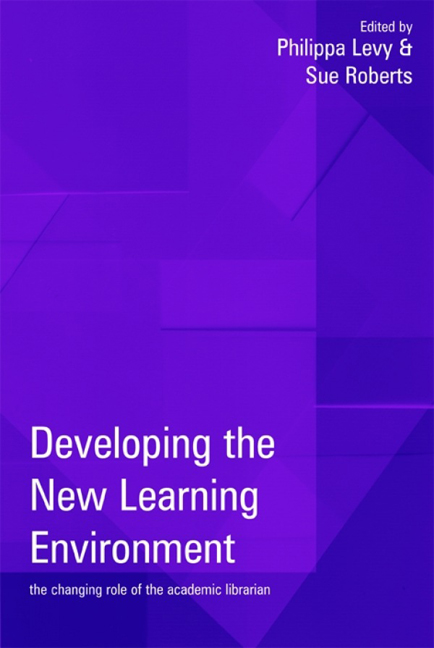Book contents
- Frontmatter
- Contents
- The editors and contributors
- Introduction: the challenge for the academic librarian
- Part 1 Perspectives on the policy framework
- 1 The policy framework: a critical review
- 2 Pedagogy in a changing environment
- 3 Literacies and learning
- 4 Key issues in the design and delivery of technology-enhanced learning
- 5 New professional identities and practices for learner support
- Part 2 Policy into practice
- Part 3 Reflections
- Index
2 - Pedagogy in a changing environment
from Part 1 - Perspectives on the policy framework
Published online by Cambridge University Press: 08 June 2018
- Frontmatter
- Contents
- The editors and contributors
- Introduction: the challenge for the academic librarian
- Part 1 Perspectives on the policy framework
- 1 The policy framework: a critical review
- 2 Pedagogy in a changing environment
- 3 Literacies and learning
- 4 Key issues in the design and delivery of technology-enhanced learning
- 5 New professional identities and practices for learner support
- Part 2 Policy into practice
- Part 3 Reflections
- Index
Summary
Philippa Levy picks up on the point made by Peter Brophy in the previous chapter regarding the need for increased pedagogical awareness within the library community as librarians become increasingly active in learning support and teaching in an environment in which there is continuing – perhaps increasing – emphasis on student-centred learning. The chapter reviews key strands of current educational theory and research, focusing in particular on the principles that underpin constructivist perspectives on learning and teaching, and the implications of these principles for the design and facilitation of ICT-enhanced, active learning. The shift from ‘transmission’-style pedagogy to task-focused pedagogy brings with it a commitment to engaging students in processes of dialogue, feedback, reflection, collaboration and participation in learning communities, and a change in the tutor's role from instructor to scaffolder or facilitator of learning conversations. The chapter also identifies the need for careful ‘information design’ in constructivist pedagogy, and points to a particular role here for the information specialist. The chapter concludes with the suggestion that, as their engagement with educational practice increases, becoming involved in practitioner-based pedagogical inquiry will help librarians in the development of their own pedagogical awareness and will strengthen their contribution to pedagogical knowledge and innovation within the sector as a whole.
Introduction
This chapter focuses on the theme of pedagogy in an educational environment in which the use of information and communication technologies (ICT) to support learning is increasingly pervasive. E-learning development has progressed at a rapid pace within UK higher education (HE) over the past decade, particularly in terms of infrastructure. In response to the government's White Paper The Future of Higher Education (Department for Education and Skills, 2003) the Higher Education Funding Committee for England (HEFCE) has recently confirmed its strategic commitment to embedding e-learning in a ‘full and sustainable way’ into the experience of learning and teaching in the sector within the next ten years (HEFCE, 2005). The early concentration on infrastructure is shifting towards a stronger focus on issues of pedagogy for both distance learning and for blended approaches in which ICT is used to mediate access to learning activities, interactions and resources in combination with face-to-face approaches.
- Type
- Chapter
- Information
- Developing the New Learning EnvironmentThe changing role of the academic librarian, pp. 24 - 48Publisher: FacetPrint publication year: 2005
- 3
- Cited by



